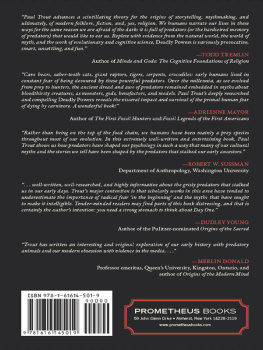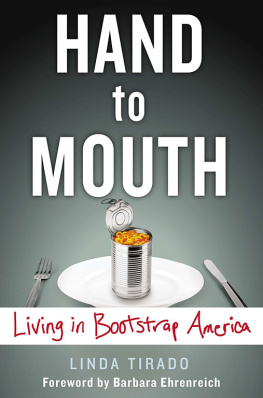Praise for Bait and Switch by Barbara Ehrenreich
Ehrenreich is a keen observer of American culture.
Fortune
Bait and Switch... resembles a novel by Evelyn Waugh, in which a middle-aged social critic with supersonic verbal skills, a Voltaire pretending to be a Candide, disappears into a zombie zone of career counselors, rsum writers, networking and job fairs.
Harpers
Insightful... her experiences are perversely fascinating, and Ehrenreich conveys them with humor and aplomb.
Business Week
Wry, eloquent, hilarious.
Entertainment Weekly
Acerbic and astute.
Mother Jones
Illuminating... falls smartest read.
Glamour
Vivid and compelling.
Dissent
The humorous and the melancholy are tightly entwined throughout the book.
Newsday
Ehrenreich uncovers outposts... that most journalists would have trouble learning about.... What Ehrenreich has found is something that cant be gleaned from reams of data about levels of middle-class income and unemployment.
Columbia Journalism Review
Engaging.
The Seattle Times
Skillfully dissects how job gurus deploy the language of self-actualization and magic thinking to cow their clients.
Elle
Sharply observed and, perhaps more surprising, funny.
Common Wealth
Laugh-out-loud funny.
The Richmond Times-Dispatch
Being unemployed is devastating, and Ehrenreich does a sound job reminding us of the emotional toll.
Fast Company Magazine
Ehrenreichs description of the dull-eyed anomie of the white middle class is spot on.
The American Conservative
Ehrenreichs acerbic critiques are devastating.... She does a superb job of focusing the spotlight on a nether world of those without jobs or those profoundly shaken by their inability to find economic security.
The Charlotte Observer
ALSO BY BARBARA EHRENREICH
Nickel and Dimed: On (Not) Getting By in America
Blood Rites: Origins and History of the Passions of War
The Snarling Citizen
Kippers Game
The Worst Years of Our Lives: Irreverent Notes from a Decade of Greed
Fear of Falling: The Inner Life of the Middle Class
The Hearts of Men: American Dreams and the Flight from Commitment
Global Woman: Nannies, Maids, and Sex Workers in the New Economy
(with Arlie Russell Hochschild)
Re-making Love: The Feminization of Sex
(with Elizabeth Hess and Gloria Jacobs)
For Her Own Good: 150 Years of the Experts Advice to Women
(with Deirdre English)
Witches, Midwives, and Nurses: A History of Women Healers
(with Deirdre English)
Complaints and Disorders: The Sexual Politics of Sickness
(with Deirdre English)
Bait and Switch
Bait and Switch
The (Futile) Pursuit of the American Dream
Barbara Ehrenreich


Owl Books
Henry Holt and Company, LLC
Publishers since 1866
175 Fifth Avenue
New York, New York 10010
www.henryholt.com
An Owl Book and  are registered trademarks of
are registered trademarks of
Henry Holt and Company, LLC.
Copyright 2005 by Barbara Ehrenreich
All rights reserved.
Distributed in Canada by H. B. Fenn and Company Ltd.
Library of Congress Cataloging-in-Publication Data
Ehrenreich, Barbara.
Bait and switch: the (futile) pursuit of the American dream / Barbara Ehrenreich.1st ed.
p. cm.
ISBN-10: 0-8050-8124-0
ISBN-13: 978-0-8050-8124-4
1. Displaced workersUnited States. 2. White collar workersUnited States. 3. Job huntingUnited States. 4. Downward mobility (Social sciences)United States. I. Title.
HD5708.55.U6E47 2005
654.1408622dc22
2005047916
Henry Holt books are available for special promotions and
premiums. For details contact: Director, Special Markets.
Originally published in hardcover in 2005
by Metropolitan Books
First Owl Books Edition 2006
Designed by Kelly Too
Printed in the United States of America
1 3 5 7 9 10 8 6 4 2
contents
authors note
Most names in this book have been changed in the interest of privacy. The exceptions, in the majority of cases, are public speakers who were introduced by name and people I interviewed who agreed to have their full names used.
Bait and Switch
Introduction
Because Ive written a lot about poverty, Im used to hearing from people in scary circumstances. An eviction notice has arrived. A child has been diagnosed with a serious illness and the health insurance has run out. The car has broken down and theres no way to get to work. These are the routine emergencies that plague the chronically poor. But it struck me, starting in about 2002, that many such tales of hardship were coming from people who were once members in good standing of the middle classcollege graduates and former occupants of midlevel white-collar positions. One such writer upbraided me for what she saw as my neglect of hardworking, virtuous people like herself.
Try investigating people like me who didnt have babies in high school, who made good grades, who work hard and dont kiss a lot of ass and instead of getting promoted or paid fairly must regress to working for $7/hr., having their student loans in perpetual deferment, living at home with their parents, and generally exist in debt which they feel they may never get out of.
Stories of white-collar downward mobility cannot be brushed off as easily as accounts of blue-collar economic woes, which the hard-hearted traditionally blame on bad choices: failing to get a college degree, for example, failing to postpone child-bearing until acquiring a nest egg, or failing to choose affluent parents in the first place. But distressed white-collar people cannot be accused of fecklessness of any kind; they are the ones who did everything right. They earned higher degrees, often setting aside their youthful passion for philosophy or music to suffer through dull practical majors like management or finance. In some cases, they were high achievers who ran into trouble precisely because they had risen far enough in the company for their salaries to look like a tempting cost cut. They were the losers, in other words, in a classic game of bait and switch. And while blue-collar poverty has become numbingly routine, white-collar unemploymentand the poverty that often resultsremains a rude finger in the face of the American dream.
I realized that I knew very little about the mid- to upper levels of the corporate world, having so far encountered this world almost entirely through its low-wage, entry-level representatives. I was one of thema server in a national chain restaurant, a cleaning person, and a Wal-Mart associatein the course of researching an earlier book, Nickel and Dimed: On (Not) Getting By in America. Like everyone else, Ive also encountered the corporate world as a consumer, dealing with people
But there have been growing signs of troubleif not outright miserywithin the white-collar corporate workforce. First, starting with the economic downturn of 2001, there has been a rise in unemployment among highly credentialed and experienced people. In late 2003, when I started this project, unemployment was running at about 5.9 percent, but in contrast to earlier economic downturns, a sizable portionalmost 20 percent, or about 1.6 millionof the unemployed were white-collar professionals. Throughout the first four years of the 2000s, there were similar stories of the mighty or the mere midlevel brought low, ejected from their office suites and forced to serve behind the counter at Starbucks.
Next page


















 are registered trademarks of
are registered trademarks of